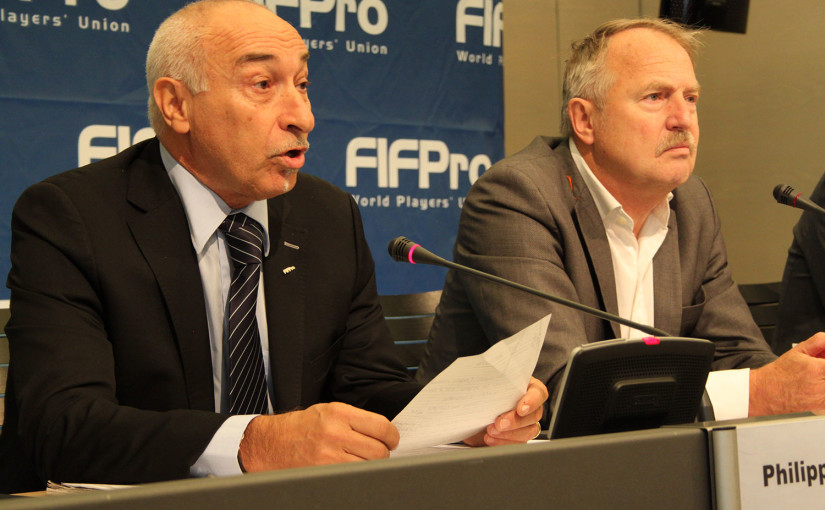By Andrew Warshaw
September 18 – Citing what it described as the “shocking imbalance” between the respective rights of clubs and players, the international players’ union FIFpro has lodged an official legal complaint with the European Commission in a move that could overhaul the entire transfer system.
The action by FIFpro, which represents some 65,000 footballers, has the potential to create the biggest challenge to the status quo since the 1995 Bosman ruling that changed the face of European football.
FIFPro believes the current market undermines its members’ rights to move between clubs and unfairly allows elite clubs to stockpile the best players. It wants the current arrangement abolished and replaced with a bargaining system.
The complaint argues the present system is “anti-competitive, unjustified and illegal” and FIFpro chairman Philippe Piat (pictured left) said it was the last resort after the breakdown of talks with all the relevant stakeholders.
Arguing that players were often harshly punished for breaking contracts compared to clubs who sometimes “get off Scot-free”, Piat said the imbalance had to be rectified.
“What we find is if a player does not want to extend his contract there are immediate reprisals,” he said. “Contracts have become a financial tool. Many players end up extending their contracts, only to be sold off at the next transfer window, even 15 days later. How can this be the case?
“Players are being turned into commodities, they are no longer human beings. This is getting out of hand. Some stars are incredibly wealthy but at small clubs in small countries there is almost slavery.”
The current transfer rules, which are governed by FIFA, have been in force since 2001 after they were accepted by the European Commission. But elaborating on the theme of the system failing to protect players at lower level, Piat said the regulations had patently failed to protect contractual stability, redistribution of revenue and competitive balance as well as the training of young players.
“The European Commission should ensure that all rules are respected but this is not the case. We want to ensure all this is modified. We have great concerns about the financial bubble which could burst soon in the football transfer system. There is no solidarity between clubs. Often clubs say the transfer system is necessary because the money of the rich will filter down but that is not the case.
“Some 67% of the money paid in transfer fees by large clubs goes back to just a few clubs at the top so the money stays among the elite and only a little amount filters down to the little clubs.”
FIFPro argues that away from the glamour of the big leagues, players struggle to get paid on time. “Thousands of our members, who go month after month without being paid, are desperate,” said FIFPro secretary general Theo van Seggelen.
“More and more people are feeding off of this transfer market for their personal gain. We think it should be a fundamental right of players to receive their salaries. We have consulted with the clubs, but we have not come to a solution. We now have no choice but to go to the European Commission.”
“We need not fear a football world without the transfer system. Through collective bargaining, better labour market rules can be established. Balanced fairly against the needs of clubs, together with an improved model of revenue distribution, we will safeguard football’s future. For years we have tried to negotiate a fair reform with the other stakeholders and failed.
“Players, especially young players, need more protection, there must be a better distribution of transfer monies to help small clubs and we must reduce the number of restrictions. The system needs to change.”
Earlier this month Karl-Heinz Rummenigge, chairman of the 200-strong European Club Association, appealed for FIFPro to engage in further discussions but the union has grown increasingly impatient. They want four key changes made to the rules:
• Any player not paid by their club for more than 30 days can terminate their contract providing they have given the club at least 10 days’ written notice
• If a contract is terminated by the club without just cause or by the player for non-payment, the player should be compensated by having the contract paid out by the club
• Any player without a contract after the process above should be able to find work immediately, without having to wait for a transfer window to open
• These reforms should apply domestically and internationally
“We are not trying to blow up the transfer system,” insisted van Seggelen. “We want to bring balance between the rights of players and clubs.”
Contact the writer of this story at moc.l1745224379labto1745224379ofdlr1745224379owedi1745224379sni@w1745224379ahsra1745224379w.wer1745224379dna1745224379

